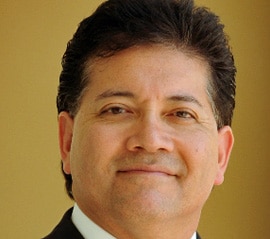
Las Cruces Mayor Ken Miyagishima
You can view unofficial results from Tuesday’s election by clicking here.
It wasn’t even close. In a resounding manner, voters in Las Cruces endorsed the work of incumbents who were up for re-election on Tuesday.
This year’s contest was a test of what voters think about the work of progressive-backed candidates who took over city government between 2007 and 2009. Mayor Ken Miyagishima said the large margins by which he and other incumbents won are easy to interpret.
“I think voters are happy with the way things are at the city,” Miyagishima said after winning 62 percent of the vote in a three-way contest. “They’re happy with the way that we try to be as transparent and inclusive as possible.”
Miguel Silva, the District 1 councilor who won re-election with 69 percent of the vote, called Tuesday’s election “an affirmation of the work that we’ve been doing.”
“We’ve done some good work in some very tough times,” Silva said.
According to the campaign Miyagishima ran, that work included being fiscally responsible by storing up twice the required amount of cash in city reserves and cutting the budget, increasing amenities by building a new aquatic center and adding new parks, enhancing public safety with a new emergency alert system and a police audit system, increasing openness and accessibility with more neighborhood meetings, growing more smartly with new policies, building a new city hall and revitalizing downtown, and implementing curbside recycling.
In other words, Miyagishima argued that, under his leadership, the city has done it all in the last four years.
Voters saw no reason to boot him or the other incumbents from office, which means they’ll have another four years to make the changes they promised to voters. Miyagishima said the economy will remain the biggest challenge. He expects state and federal funding for cities to continue to drop in the coming years and said Las Cruces must operate more efficiently.
He plans an initiative to allow some city employees to volunteer to work from home – cutting their personal costs such as driving and childcare – in exchange for taking 5-percent pay cuts. He also hopes to reduce the city’s health-care costs with an initiative that encourages employees to exercise more.
‘No one has figured out how to beat progressives’
Of course, it wasn’t just the incumbents’ policy work that led voters to re-elect Miyagishima, Silva, and District 4 Councilor Nathan Small, who won 70 percent of the vote in his race. Campaigning was key. On the NMPolitics.net election night liveblog, a commenter who called himself High Range Lefty – a volunteer on Miyagishima’s campaign – credited Don Kurtz, a progressive strategist who worked for Miyagishima.
“Kudos to Don Kurtz who has brought organization and discipline to running grassroots-driven elections in LC,” High Range Lefty wrote.
On the liveblog, Doña Ana County Commissioner Scott Krahling agreed.
“If these results hold, it also says that no one has figured out how to beat progressives in this community,” he wrote before the results became final. “The common assumption was that these folks came into office because of the horrible land deal on the east mesa. Maybe it’s bigger than that.”
Krahling was referring to the rapid growth Las Cruces experienced in the years leading to the progressive takeover. Fueled in part by a controversial 90,000-acre land deal on the East Mesa, progressive candidates took control with a promise to be smarter about growth and development.
‘Forward-looking leadership won big’
The organization and political strategy of progressives was key to Miyagishima’s re-election victory. But there’s no denying the message voters sent in re-electing incumbents. Noting that turnout was about 10,100 voters – about 1,300 fewer than in 2007 – High Range Lefty suggested that, “The lower vote total coupled with the incumbents winning may indicate that more people are satisfied with how the city is working these days.”
And on Facebook, former State Rep. Jeff Steinborn wrote that the election “shows that this town has much more of a consensus on where we would like to go than some have tried to make us believe.”
“I personally am heartened to see that forward-looking leadership won big tonight,” he said.
Others had their own ideas. Brian Kirby wrote on Facebook that national politics made their way into the Las Cruces election. Republicans running for mayor and council seats all lost, badly. With the exception of Judge Melissa Miller-Byrnes, a Republican, all of Tuesday’s winners were Democrats.
“Three recent polls show that the majority of Americans believe that Republican congressional members are putting their own agendas ahead of the greater good,” Kirby wrote. “Locally, people have a negative view of the parenthetical R that appears before/after a politician’s name.”
Bob Cornelius, a Republican and former land commissioner candidate, noted the low voter turnout in writing on Facebook that it’s “hard to gauge the meaning of an election when such a small percentage took the time to vote in it.”
A very definite message
The only non-incumbent to be elected Tuesday, Gregory Z. Smith, who won the open District 2 seat on the City Council, said the incumbents’ victories “would seem to be an endorsement for their efforts.”
Smith replaces Dolores Connor, who gave up the seat to run against Miyagishima. Silva said Connor “was one of the hardest-working councilors” and will be missed.
Connor posted on Facebook that it takes “dedication and compassion to be a part of an election, and as we now can see, it can happen with those who turn out to vote.”
In Las Cruces, those who turned out to vote sent a very definite message about the city’s direction on Tuesday: Keep it up.
A prior version of this posting incorrectly stated that turnout was about 9,100 in Tuesday’s election.
